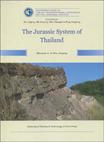泰国的侏罗系
2010-8
中国科学技术大学出版社
(泰)米苏克 等著
125
The Jurassic period (200~145 Ma) witnessed a number of important geological, geographical, climatological, biological and metallogenical events happened globally.During the Jurassic, China and environs as a domain was bordered by the western palaeo-Pacifc in east and by the Tethys in west, and it was connected to Russia in north and located at the junction between the western palaeo-Pacific and northeastern Tethys. The Jurassic rocks of China and environs are therefore the largest geological body which has recorded various geological events happened in the Tethyan, subboreal and palaeo-Pacific realms both in marine and non-marine systems.The International Jurassic Congress is an international scientific forum on the Jurassic held once every four years sponsored by the International Subcommittee on the Jurassic System. The Jurassic experts and students from around the world gather together to present their recent work and research results on the topics of geology, stratigraphy, palaeontology, palaeobiology, palaeogeography, palaeoecology, palaeoclimatology, sedimentology, geochemistry, palaeomagnetism, tectonics, astronomic geology, and mineral and energy resources, as well as ideas on geosciences education and geoheritage protection, to predict the Earth's future, and to discuss the international collaborations focus on such issues as challenges of global change.
DuringtheJurassic,Chinaandenvironsasadomainwasborderedbythewesternpalaeo-PacifcineastandbytheTethysinwest,anditwasconnectedtoRussiainnorthandlocatedatthejunctionbetweenthewesternpalaeo-PacificandnortheasternTethys.TheJurassicrocksofChinaandenvironsarethereforethelargestgeologicalbodywhichhasrecordedvariousgeologicaleventshappenedintheTethyan,subborealandpalaeo-Pacificrealmsbothinmarineandnon-marinesystems.
米苏克,A.,博士,泰国矿产资源部化石保护局主任,主要从事地层学、古生物学、沉积学研究和矿产资源勘察等。
PREFACEABSTRACTChapter 1 INTRODUCTION Ⅰ. General information Ⅱ. Marine Jurassic rocks of Thailand Ⅲ. Jurassic LocalityChapter 2 PREVIOUS WORKSChapter 3 REGiONAl GEOLOGIC SETTING Ⅰ. Mae Sot-Umphang area, Tak Province, northwestern Thailand Ⅱ. Phop Phra area, Tak Province, northwestern Thailand Ⅲ. Chumphon area, Chumphon Province, Peninsular Thailand Ⅳ. Thung Song-Khlong Thom area, Nakhon Si Thammarat and Krabi Provinces, Peninsular Thailand Ⅴ. Ao Luk-Plai Phraya area, Krabi and Surat Thani Provinces, Peninsular ThailandChapter 4 MARINE JURASSIC ROCKS OF NORTH——WESTERN THAILAND Ⅰ. Jurassic of the Khun Yuam-Mae Hong Son area 1. Lithostratigraphy 2. Fauna and age of the Khun Yuam-Mae Hong Son area Ⅱ. Marine Jurassic of the Mae Sot area 1. Lithostratigraphy 2. Fauna and age of the Hua Fai Group in the Mae Sot area Ⅲ. Marine Jurassic of the Phop Phra area 1. Lithostratigraphy of the Phop Phra area 2. Fauna and age of the Phop Phra area Ⅳ. Marine Jurassic of the Umphang area 1. Lithostratigraphy 2. Fauna and age of the Umphang area Ⅴ. Marine Jurassic of the Kanchanaburi areaChapter 5 MARINE JURASSIC OF PENINSULAR THAILANDChapter 6 NON-MARINE JURASSIC OF NORTHERN, NORTHEASTERN,Chapter 7 FAUNAL ASSOCIATIONS, PALEOECOLOGY AND PALEOENVIRONMENTChapter 8 MINERAL ASSOCIATIONChapter 9 DETAILED LITHOSTRATIGRAPHY AND PETROGRAPHY OF THE SELECTEDChapter 10 CONCLUSIONSACKNOWLEDGEMENTSREFERENCES
插图:The geology of many regions has been described previously by various workers, e.g. Cotter (1924), Heim and Herschi (1939), Brown et al. (1951), Ward and Bunnag (1964), Sato (1961), Komalarjun and Sato (1964), Sato (1975), Braun and Jordan (1976), Hagen and Kemper (1976), Kemper et al. (1976), Kemper (1976), Chonglakmani (1983), Chonglakmanietal. (1985), Meesooketal. (1985), Charoenpravatetal. (1985), Tantiwanit et al. (1987), Fontaine and Suteethorn (1988), Sato and Westermann (1991), Beauvais and Fontaine (1993), Meesook (1994), Meesook and GrantMackie (1994), Meesook and Grant-Mackie (1996), as follows:The limestone of Ban Yang Puteh, 12 km southeast of the Mae Sot District near a tributary of Huai Mae Ku, was thought to be a continuation of the Kamawkala limestone of eastern Myanmar (Cotter, 1924).During reconnaissance geological surveys in northern Thailand, Heim and Herschi (1939) mentioned the presence of a Late Jurassic-Early Cretaceous formation about 18 km south of Mae Sot District. Some small fossils were found in nodular layers and kidney-shaped concretions of limestone occurring in a "red formation". The nature and details of these fossils were not indicated.Resulting in mineral exploration conducted jointly by geologists of the United States Geological Survey and Thai Department of Mineral Resources, the first geological map of Thailand was published in 1951 on scale of 1 : 2,500,000 (Brown et al., 1951). They also described the general stratigraphy of Thailand and recorded ammonites identified asErycites, Tmetoceras and Ludwigia at Ban Yang Puteh and at a limestone outcrop 3 km to the south-southwest, indicative of early Middle Jurassic age.Hayami (1960) studied the bivalves including Eomiodon chumponensis n sp. in argillaceous sandstone at Haat Sai Ri and Pak Nam Chumphon of Chumphon Province and concluded a probable Jurassic age.
《泰国的侏罗系(英文)》是第八届国际侏罗系大会地层丛书之一。
